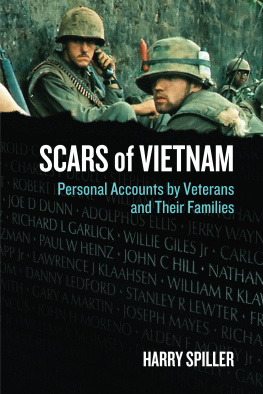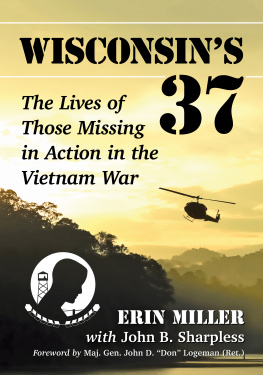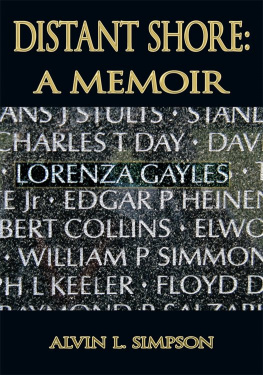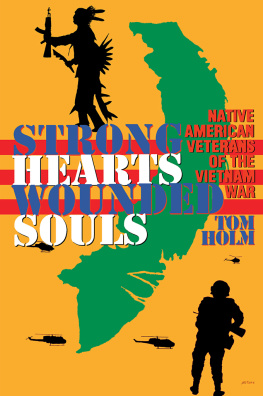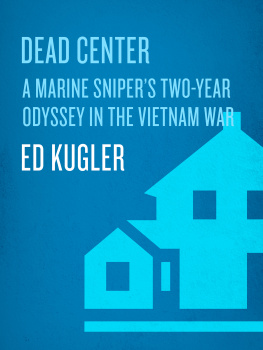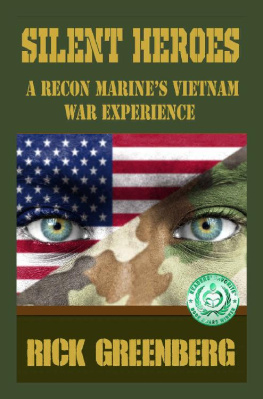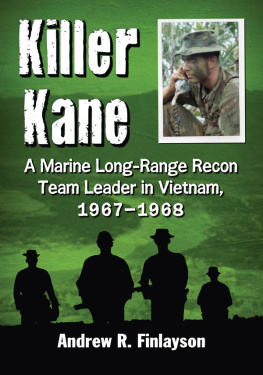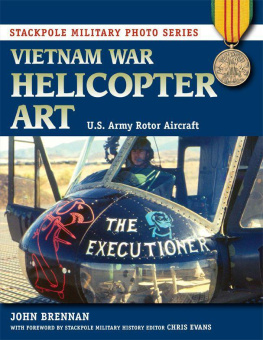
ALSO BY HARRY SPILLER
AND FROM MCFARLAND
Veterans of Iraq and Afghanistan: Personal Accounts of 22 Americans Who Served (2014)
Death Angel: A Vietnam Memoir of a Bearer of Death Messages to Families (1992; paperback 2012)
Support Programs for Ex-Offenders: A State-by-State Directory (2011)
American POWs in World War II: Twelve Personal Accounts of Captivity by Germany and Japan (2009)
Pearl Harbor Survivors: An Oral History of 24 Servicemen (2002) American POWs in Korea: Sixteen Personal Accounts (1998)
Prisoners of Nazis: Accounts by American POWs in World War II (1998)
Scars of Vietnam
Personal Accounts by Veterans and Their Families
HARRY SPILLER

McFarland & Company, Inc., Publishers
Jefferson, North Carolina
LIBRARY OF CONGRESS CATALOGUING DATA ARE AVAILABLE
BRITISH LIBRARY CATALOGUING DATA ARE AVAILABLE
e-ISBN: 978-0-7864-8783-7
1994 Harry Spiller. All rights reserved
No part of this book may be reproduced or transmitted in any form or by any means, electronic or mechanical, including photocopying or recording, or by any information storage and retrieval system, without permission in writing from the publisher.
On the cover: (top) Soldiers of the Fifth Marine Regiment during the Battle of Hue, 1968 (National Archives and Records Administration); (bottom) Vietnam Veterans Memorial, Washington, D.C. Front cover design by Rob Cheney (http://robcheney.com/)
McFarland & Company, Inc., Publishers
Box 611, Jefferson, North Carolina 28640
www.mcfarlandpub.com
Acknowledgments
For their assistance I wish to thank Barbara Randolph; Marion Carroll; Gary Smith; Terri Rentfro; Cindy Malley; Sherry Ing; Gene Ing; Linda S. Horn; Pat Wagnor; Carol Mitchell; Shirl; Lisa; Chad; the county recorders offices in Pulaski County and Alexander County in Illinois and Cape Girardeau County, Scott County, Mississippi County, Iron County, Bollinger County, Madison County, St. Francois County, Ste. Genevieve County, and Perry County in Missouri; and the photo lab at John A. Logan College.
Introduction
In the 1960s, Americans perceptions of world events tended to be shaped by the view that other nations and their leaders were cleanly divided into good guys and bad guysan outlook that some political scientists and historians have called the Orthodox Theory. The theory grew out of the Cold War and events like the Soviet invasions of Hungary, Poland, and other European countries, all of which appeared to support the idea that the central foreign policy goal of the Soviet Union was world domination.
Further, the threat of communism was brought into the living rooms of Americans via the television. I can remember watching a short, fat, bald man with a large mole on his cheek on the evening news almost every night. He shook his fist and barked in Russian, then afterward often grinned, exposing a wide gap between his front teeth. I rarely knew what he had said, but I surmised that it had to be something sneaky; after all, I was a good guy and he was a bad guy.
The Russians had put Sputnik and the first man into space, confirming their threat. But no one event was more convincing that the communists were working toward world domination than the Cuban Missile Crisis. When Kennedy stood up against the Soviets only 90 miles from the U.S. shores it sparked the new commitment he spoke of in his inaugural address. People wore buttons that said give a damn and became committed to ask not what your country can do for you, but rather ask what you can do for your country.
As a teenager my own patriotism was further strengthened by reading such books as Guadalcanal Diary, The Bataan Death March, The Bridge Over the River Kwai, Merrills Marauders, The Sands of Iwo Jima, and Normandy Beach, and by watching Vic Morrows television series Combat. I had no doubt that my future lay in the armed servicesI was just a little confused as to which branch of service I would join. During my high school years I joined each branch at least twice, in my dreams, depending on which movie I had seen or which book I was reading.
A few times during those years I slipped into an academic mood and decided that first I should go to college. That ended, though, when in my sophomore year my guidance counselor informed me that, You best forget college. You could never handle the studies. Although I didnt realize it at the time, his decision was based more on the quality of clothes I wore than on my academic abilityI held a B average and never studied.
I joined the Sea Scouts and the Civil Air Patrol. At the organizational events I proudly displayed myself in my Navy or Air Force uniform, depending on the event, hoping the girls would notice me while I strutted around and dreamed of being home on leave from the service. Then my senior year in high school arrived and I heard that the Marine Corps had a new program through which it was possible to enlist immediately and leave to enter active duty as much as four months later. I scurried to the recruiting office to investigate.
I immediately decided to join the Marine Corps based on two powerful lures: the dress blue uniform, which speaks for itself, and the 120-day delay program, which no other branch had yet offered. I was in such a hurry to sign on the dotted line that I enlisted in February 1963 at the age of 17.
I had four months until graduation, and until I was to join the ranks of a few good men. For the next 120 days my thoughts never strayed from my departure date of June 2, 1963five days after graduation. I made a calendar on a piece of notebook paper and hung it on the wall in my bedroom so I could mark off each day. I talked about it at school, and when the final school newspaper of the year published a list of the graduating seniors plans, mine read, Harry Spiller, Career U.S. Marine Corps. Leaves June 2.
After going through MCRD San Diego and Infantry Training at Camp Pendleton, I was assigned to the 4th Marines in Hawaii. I spent a year and a half either humping the hills of the Hawaiian Islands or being dropped off in some remote jungle area on a survival course. We didnt have to worry about surviving snakebite because there are no snakes on the Islands, but we did have to worry about shitting ourselves to death from eating so many guavas.
The first time I ever paid real attention to Vietnam was in 1964 when Da Nang air base was attacked by the Viet Cong. Americans had over 100 casualties. Four months later, to my surprise, I was sitting in an open field just outside of Phu Bai village in Vietnam. I spent my time in Nam playing good guy on patrols and ambushes, digging foxholes, sweating, staring into the night, and doing my share of American colonialism by destroying the dignity of a people that I did not understand nor care to understand. For answering the call of my country in 1965 I received a gross income of $1,989. That same year Sandy Koufax pitched for the Los Angeles Dodgers and was paid $125,000.
I returned to the States and was stationed at MCRD San Diego where my career had begun in the Corps. I was assigned to the Communications and Electronics Battalion, but after several months I got the itch to move on. I was no longer sure I wanted to make the Corps a career, but things were attractive. I was a sergeant, I was single, I had a 1963 Chevy convertible, and the re-enlistment bonus was tripled because the Corps needed infantrymen. I signed the contract in 1966 and was paid my triple bonus of $3,200. The same year Koufax retired from the Dodgers and signed a contract as a sports announcer, for a salary of one million dollars.
Next page
